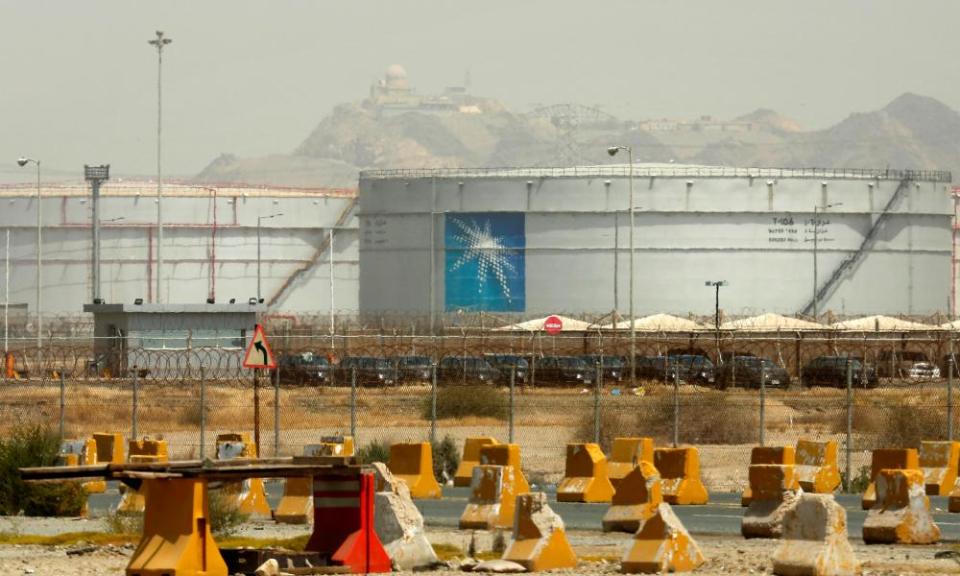£19.3bn of fossil fuels imported by UK from authoritarian states in year since Ukraine war

UK fossil fuel imports from authoritarian petrostates surged to £19.3bn in the year following Russia’s invasion of Ukraine, it can be revealed.
Efforts to end the purchasing of oil and gas from Russia appear to have resulted in a surge in imports from other authoritarian regimes, including Algeria, Bahrain, Kuwait, Libya, Qatar, Saudi Arabia and the United Arab Emirates (UAE), according to data from the Office for National Statistics analysed by DeSmog.
Last month the trade and business secretary, Kemi Badenoch, travelled to the Middle East to “boost trade ties” with the Gulf Cooperation Council (GCC), a six-country trade bloc comprising Bahrain, Kuwait, Oman, Qatar, Saudi Arabia and the UAE. Trade between the UK and the GCC hit a record high of £61.3bn in 2022.
In her speech to the Conservative party conference in October 2022, the then prime minister, Liz Truss, said the UK had “become too complacent” and “too dependent on authoritarian regimes for cheap goods and energy”. However, it appears that the UK has diverted its spending from Russia to other states accused of human rights violations and engaged in brutal conflicts.
Fossil fuel imports from Russia fell from £600m in February 2022, the month Vladimir Putin launched his invasion of Ukraine, to zero in January 2023. However, this was compensated for by a more than 60% annual increase in fossil fuel imports from other authoritarian petrostates.
Last year the amount spent by the UK on energy imports topped £100bn for the first time on record, with DeSmog’s analysis indicating that the UK spent more than £125.7bn on fossil fuel imports in the year beginning February 2022.
The International Energy Agency has stated that, in order to achieve net zero, the world must achieve “huge declines in the use of coal, oil and gas”, requiring “nothing short of the complete transformation of the global energy system”.
The UK imported £6.9bn of fossil fuels from Qatar, £3.4bn from Saudi Arabia, £2.6bn from Kuwait, and £2.5bn from the UAE.

“While cutting our dependence on Russian fossil fuels is both necessary and laudable – albeit with little actual choice – it is a half-measure if only aimed at reducing fossil fuels from Russia,” said Dominic Kavakeb, of the human rights and environmental pressure group Global Witness.
“Replacing Russian energy with fossil fuels from other authoritarian regimes, some of which are also engaged in brutal conflicts, is at best shortsighted, at worst a gross hypocrisy. Fossil fuels are the currency of dictators and warmongers everywhere. It’s time to build an energy system that benefits people and the planet, rather than polluters, petrostates and despots.”
This year’s Cop28 UN climate summit will be held in the UAE, a nation that has attracted criticism over its plans to expand fossil fuel operations and its appointment of Sultan Al Jaber, head of the Abu Dhabi National Oil Company, as summit president. Al Jaber recently said that fossil fuels should “continue to play a role in the foreseeable future” – a statement labelled as “very dangerous” by former UN climate chief Christiana Figueres.
The average monthly value of fossil fuel imports from the UAE to the UK increased from £84.4m in the year to February 2022 to £195m the year after.
The UAE continues to arrest and imprison activists, academics and lawyers who speak out against its monarchic rulers. UAE authorities also continue to discriminate against women, LGBTQ+ communities, and migrants.
Despite record high prices for oil and gas – a response to Russia’s invasion and loosened Covid restrictions – the volume of fossil fuels imported to the UK during 2022 remained stable, according to data from the Department for Energy Security and Net Zero (Desnz).
Saudi Arabia was an increasingly significant energy source for the UK, with monthly fossil fuel imports from the Kingdom quadrupling from £50.4m to £263.8m in the year ending February 2023.
The Foreign, Commonwealth and Development Office has noted the prevalence of arbitrary detention in Saudi Arabia – calling it “a hallmark of authoritarian regimes” – as well as reports of torture, neglect, lack of medical care and solitary confinement. Saudi Arabia also routinely executes political dissidents, having killed an average of 129 people a year since crown prince Mohammed bin Salman assumed de facto rule in 2015.
Neighbouring Qatar has also profited from higher fossil fuel exports to the UK, jumping to £531.5m a month on average in the year following Russia’s invasion of Ukraine from an average of £201.1m the year before.
Last year’s football World Cup highlighted Qatar’s poor record on human rights, particularly in relation to migrant workers. A Guardian analysis in February 2021 found that over 6,500 migrants from South Asian countries had died in Qatar since it was awarded the World Cup in 2011.

Despite the UK government having incrementally banned the importation of Russian fossil fuels following Putin’s invasion, Russian fossil fuels are still entering the UK indirectly via imports from India, which is a major importer alongside China. Global demand for Russian oil has now surged to its highest level since the invasion.
Dr David Wearing, a lecturer in international relations at Sussex University, said the UK’s increased reliance on Gulf states for fossil fuels and investment was based “not on an economic calculation but a strategic political calculation”.
Gulf states sent “a big chunk of their petrodollars into our financial system”, Wearing said. “Those capital flows help to square off the fact that Britain’s got a huge deficit on its current account [imports v exports], which becomes more important with Brexit … That’s the crux of the relationship.”
Gulf fossil fuels were “strategically important in terms of power politics too”, Wearing said, in terms of keeping these countries aligned with the west rather than China. “For all these different reasons, it’s [seen as] important to keep the Gulf states as they are and keep those ruling families in power – so that the UK can trust them to continue staying aligned with the western bloc and sending their petrodollars into our economic system.”
The UK’s continued reliance on fossil fuels is also costly for the British population. The average UK home will spend nearly £6,000 on foreign gas in the next 12 years, including £140 on Qatari gas every year, according to a report from the Energy and Climate Change Intelligence Unit (ECIU). This cost would be reduced to £1,400 spent on foreign gas by 2030 in a typical net zero home, the ECIU said. An earlier report from the ECIU also found that, without mitigation, the UK’s dependence on imported gas was set to increase by 75% by 2035.
A government spokesperson said: “We continue to work with international partners to maintain stability in global energy markets and boost our energy security. While we are accelerating renewables and nuclear as part of our plans to power up Britain, the transition to cleaner energy cannot happen overnight and we will continue to need oil and gas over the coming decades, as recognised by the independent Climate Change Committee.”


